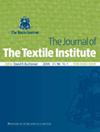Architecture tailoring of smart knitted double face comfortable strain sensors for Intelligent (E-textiles) application
IF 1.5
4区 工程技术
Q2 MATERIALS SCIENCE, TEXTILES
引用次数: 0
Abstract
Textiles-oriented flexible strain sensors have been attractive in designing intelligent clothing materials to sense the human body postural changes. However, their efficacy towards sensing performance can be tailored through fabrication architectures variation. In this study knitted strain sensors have been engineered using novel double face fabric designs. Filament polyester, and conductive polyamide coated with silver colloidal particles were used to architect sensors. The sensors provide real-time electrical resistance variation as a sensing feature w.r.t mechanical changes happening in them. Two-dimensional strain testing and comfortability evaluations were carried out to ensure sensing performance and comfortable wearing longevity of sensors. Decreasing linking yarn accumulation per unit area increased the strain sensitivity i.e. changing knit stitches with tuck and miss the sensing capability increased 28% and 95%, respectively. Comfortability of sensors had a parabolic trend, decreasing yarn accumulation enhanced comfort up to tuck-linking courses. While increasing the percentage of conductive polyamide in the linking course improved strain sensitivity by 50%. The research presents such double-face intelligent strain sensors as a suitable solution to the long-term wearability of sensors with comfort.面向智能(电子纺织品)应用的智能针织双面舒适应变传感器的结构定制
面向纺织品的柔性应变传感器在传感人体姿势变化的智能服装材料设计中具有广泛的应用前景。然而,它们对传感性能的功效可以通过制造架构的变化来定制。在本研究中,针织应变传感器采用了新颖的双面织物设计。用长丝聚酯和涂有银胶体颗粒的导电聚酰胺来构建传感器。传感器提供实时电阻变化作为传感特征,而不是机械变化发生在他们身上。为了保证传感器的传感性能和舒适穿着寿命,进行了二维应变测试和舒适性评价。减少单位面积的粘连纱累积量增加了应变敏感性,即随着褶缝和漏缝改变针脚的应变敏感性分别提高了28%和95%。传感器的舒适度呈抛物线型趋势,减小纱线累积量可提高到接扎段的舒适度。而在连接过程中增加导电聚酰胺的百分比,则使应变灵敏度提高了50%。该研究提出了这种双面智能应变传感器,为传感器的长期可穿戴性和舒适性提供了一种合适的解决方案。
本文章由计算机程序翻译,如有差异,请以英文原文为准。
求助全文
约1分钟内获得全文
求助全文
来源期刊

Journal of the Textile Institute
工程技术-材料科学:纺织
CiteScore
4.20
自引率
5.90%
发文量
149
审稿时长
1.0 months
期刊介绍:
The Journal of The Textile Institute welcomes papers concerning research and innovation, reflecting the professional interests of the Textile Institute in science, engineering, economics, management and design related to the textile industry and the use of fibres in consumer and engineering applications. Papers may encompass anything in the range of textile activities, from fibre production through textile processes and machines, to the design, marketing and use of products. Papers may also report fundamental theoretical or experimental investigations, including materials science topics in nanotechnology and smart materials, practical or commercial industrial studies and may relate to technical, economic, aesthetic, social or historical aspects of textiles and the textile industry.
All published research articles in The Journal of The Textile Institute have undergone rigorous peer review, based on initial editor screening and anonymized refereeing by two expert referees.
 求助内容:
求助内容: 应助结果提醒方式:
应助结果提醒方式:


